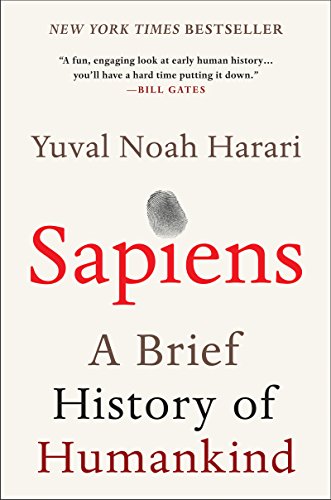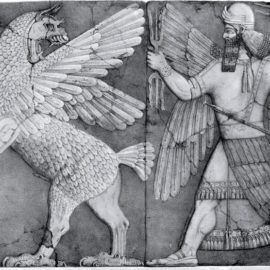

This article is an excerpt from the Shortform summary of "Sapiens: A Brief History of Humankind" by Yuval Noah Harari. Shortform has the world's best summaries of books you should be reading.
Like this article? Sign up for a free trial here .
What was the process of the evolution of human intelligence? How did the evolution of the human brain occur in tandem with the evolution of human intelligence?
The evolution of human intelligence involved an increased brain size and the development of three skills: the creation of flexible language, communication about 3rd parties, and collective fictions. This evolution gave humans a leg-up in the animal world.
We’ll cover the characteristics of the evolution of human intelligence and how that evolution shaped the modern world.
The Evolution of Human Intelligence and the Brain
Mammals that are 130 lbs typically have a brain that’s an average of 12 cubic inches. In contrast, the brains of early humans were 36 cubic inches. Today, our average brain size is 73-85 cubic inches, and the brains of Neanderthals were even bigger than ours. The growth of the brain may have impacted the evolution of human intelligence.
It seems like large brains would give us and our fellow humans an obvious advantage over other animals, but it wasn’t necessarily an asset to early humans.
The Disadvantages of a Big Brain
Big brains take a lot of energy to fuel. Our brains make up 2-3% of our body weight, but use 25% of our energy. (The brains of our ape siblings only use 8% of their energy.)
This drain of energy caused two main problems:
- Problem #1: Humans had to spend a lot of time searching for food (they needed a lot of calories to feed their hungry brains).
- Problem #2: Their muscles atrophied because their bodies had to divert energy from muscles to feed the brain.
When you’re in the middle of the food chain, trying to catch small animals and keep out of the way of big ones, using your energy to power your brain instead of your muscles isn’t the smartest strategy.
We still don’t really know why we evolved such large brains when there was little use for them in early history. It was a bad use of our energy. But although they didn’t do us much good then, they’re probably contributed to the evolution of human intelligence.
The Cognitive Revolution and the Evolution of Human Intelligence
What caused the Cognitive Revolution? No one’s really sure, but it was probably a chance gene mutation that changed the way the brain was wired. This led to the evolution of human intelligence.
The evolution of human intelligence involved the development of three new abilities, all related to language, that helped Homo sapiens outpace their fellow humans.
The Evolution of Human Intelligence, Ability #1: Flexible Language
Their language gave Sapiens a huge advantage over their fellow animals, including their fellow humans. This was a response to and contributed to the evolution of human intelligence.
Language itself isn’t particularly special—apes and monkeys communicate vocally, as do elephants, whales, and parrots. One reason the language of Sapiens was different was that it was more complex. Rather than communicating simple ideas the way green monkeys do (“Careful! A lion!” or “Careful! An eagle!”), the language of Sapiens could warn someone about a lion, describe its location, and plan how to deal with it. This allowed them to plan and follow through on complex actions like avoiding predators and working together to trap prey.
The Evolution of Human Intelligence, Ability #2: Gossip
A second distinction of the Sapiens language was its ability to convey gossip. We think of gossip as a bad thing, but using language to convey information about other people is a way to build trust. Trust is critical for social cooperation, and cooperation gives you an advantage in the struggle to survive and pass on your genes. This was another stage of the evolution of human intelligence.
Even today, most of our communication is gossip, if we define gossip as talking about other people. If we hear from a friend that the banker down the street offers fair interest rates on mortgage loans, we feel comfortable doing business with that banker, even though he’s a stranger. On the flip side, if we hear that the banker is a fraud, we stay away from her. Gossip helps us avoid strangers who may cheat us or be undependable.
Neanderthals probably didn’t have the capability to gossip. Their language was equipped to talk about lions and bison, but not other people. When they couldn’t talk about others, they couldn’t assess the trustworthiness and dependability of strangers. That meant they could only cooperate with the people they knew intimately, family members and close locals.
Because an animal can only know so many other animals intimately, the lack of the ability to gossip kept Neanderthal groups small. Sapiens, on the other hand, could form groups of up to 150 people. They didn’t need to know every group member personally to trust them. In a battle, a small group of Neanderthals was no match for a group of 150 Sapiens.
The Evolution of Human Intelligence, Ability #3: Fictions
A third benefit of the Sapiens’ language was how it was used to create fictions, also known as “social constructs” or “imagined realities.” This was a huge step forward in the evolution of human intelligence.
Being able to communicate information about things that don’t exist doesn’t seem like an advantage. But Sapiens seem to be the only animals who have this ability to discuss things that don’t have a physical presence in the world, like money, human rights, corporations, and God.
For instance, you can’t convince a monkey to give you its banana on the argument that if it does, it will get unlimited bananas when it dies and goes to heaven. Your negotiations with monkeys are limited because you can only promise rewards that exist materially in this world. Monkeys can’t create imagined realities like heaven.
Collective Fictions
In and of itself, imagining things that don’t exist isn’t an asset—you won’t aid your chances of survival if you go into the forest looking for ghosts rather than berries and deer.
What’s important about the ability to create fictions is the ability to create collective fictions, fictions everyone believes. These collective myths allow people who’ve never met and otherwise would have nothing in common to cooperate under shared assumptions and goals.
Collective fictions aren’t the same as lies. These aren’t lies because everyone collectively believes them. For example, members of the UN weren’t lying when they insisted that Libya’s government respect the rights of its citizens, even though Libya, human rights, and the UN itself are all imaginary realities, or social constructs. The borders that separate Libya from other countries are man-made, not physical features of the landscape; human rights is a concept many of us believe in, but rights don’t exist outside our collective imagination; and, like Libya, the UN is a social construct, an organization that has no physical existence.
While humans lived without these social constructs for millennia, today, imaginary realities in some cases matter more than objective realities. For instance, the survival of actual entities like rain forests and endangered river dolphins depends on the charity of imaginary entities like the United States and non-profit organizations.
These three factors played a huge part in the evolution of human intelligence.
———End of Preview———

Like what you just read? Read the rest of the world's best summary of "Sapiens" at Shortform . Learn the book's critical concepts in 20 minutes or less .
Here's what you'll find in our full Sapiens summary :
- How Sapiens outlived and outlasted the 8+ other human-like species on Earth
- The 3 critical revolutions in human existence that led to our domination of the planet
- How much of what powers our world today is really just a shared mass delusion
- What the future of humanity might look like






